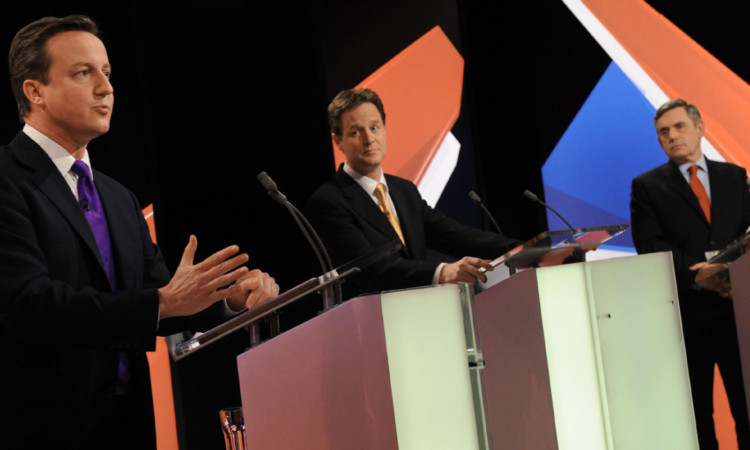A prime example of style over substance or a game-changing electoral event? Helen Brown looks at the arguments for and against the televised political debate.
Never one to step away from a potential war of words, it’s hardly surprising that arch political scrapper Alex Salmond is pushing and pushing hard for a live TV debate with UK Prime Minister David Cameron on the Scottish independence issue. So far, Mr Cameron has turned down a direct confrontation with the First Minister but is already on course to take part in a series of televised debates with Labour and the Lib Dems (and potentially Ukip) in the run-up to the 2015 General Election, along the lines of the pioneering events of 2010.
But how much influence do these televised talking-shops actually have? Do they really showcase the reality of cut-and-thrust political discourse or do they just provide memorable moments and soundbites without having much real effect on how people think and vote?
The on-screen debate in Britain may be a relative newcomer to the political armoury but it has very quickly established itself as an interesting part of any bid for power. It’s hard to believe that it took more than 50 years to reach agreement on the staging of such clashes here in the UK and that, even after the impact of 2010’s three-man, three-event marathon (pictured) with Brown, Cameron and Clegg, shown on ITV, Sky and the BBC, many pundits (and unimpressed members of the public) were expressing doubt that they would ever catch on.
It’s reckoned today that around 80 countries internationally host election debates of this kind including, interestingly, Mongolia, Afghanistan and Iraq. In the USA, of course, they have played a regular role in political manoeuvring since 1960 when the first-ever such presentation took place between Republican Vice-President Richard Nixon and rising star of the Democrats, John F Kennedy. Even without the benefit of hindsight it still gets thousands of Youtube hits it was always going to be a telling juxtaposition between old guard and new blood, but at the time, it was seen as ground-breaking. It was the first time millions of Americans had seen their potential choices up that close and that personal, with the charisma of the personable JFK winning out over the nervy, literally sweaty Nixon.
It was claimed that radio listeners plumped for Nixon while television watchers went for JFK but, in reality, the success of the Kennedy campaign that year was one of only a couple of occasions where the popularity “bounce” produced by a live and highly visually-orientated debate affected the outcome of an election. The other was in 2000, when Al Gore’s world-weary delivery was reckoned to have turned off enough voters to hand what remained a very doubtful victory to George W Bush. And in 2004, John Kerry was considered to have won all three of his debates with Bush and still lost.
In fact, there were no further US debates for 16 years after the Nixon/Kennedy battle. The historic “first” for British politics dominated the 2010 campaign, with viewing figures reaching almost 10 million but did it actually change anything then and will it next time round? Nick Clegg got the advantage of the popularity bump and was at the centre of the memorable “I agree with Nick” comments from Messrs Brown and Cameron. But did it affect the eventual outcome of the election, long predicted to be the hung parliament that it eventually delivered? And did it win hearts and change minds in any lasting way? Probably not.
It is a political truth generally acknowledged that those keenest to have such debates are those with most to gain. Tony Blair’s bluster about debating with John Major “any place, any time” soon subsided because he and his party were so far ahead in the polls.
In Scotland at present, it could certainly be argued that the SNP have a big hill to climb and that Alex Salmond’s undoubted skills as an orator and debater could be very impressive on live TV. And with the political landscape changing, perhaps First Minister Salmond sees a public clash with David Cameron, rather than with Better Together leader Alistair Darling, as a factor in establishing Scotland’s political credentials, maturity and ability to speak for itself on a national and international stage?
But it’s always wise to be careful what you wish for. As far back as 1964, then Conservative Prime Minister Alec Douglas-Home crushed Harold Wilson’s challenge to a debate by saying: “I’m not particularly attracted by confrontations of personality. If we aren’t careful, we’ll get a sort of Top of the Pops contest.”
Especially in these days of artificially constructed TV talent shows, some might see that kind of contest as the ultimate manifestation of celebrity values (or lack of them) permeating public life, with politicians judged on whether they have the X Factor rather than the experience and gravitas to get the job done.
The aforementioned Harold Wilson once sagely remarked that a week is a long time in politics. For a politican with an axe to grind or a point to make, a 90-minute public debate might be more like drawing the short straw.
